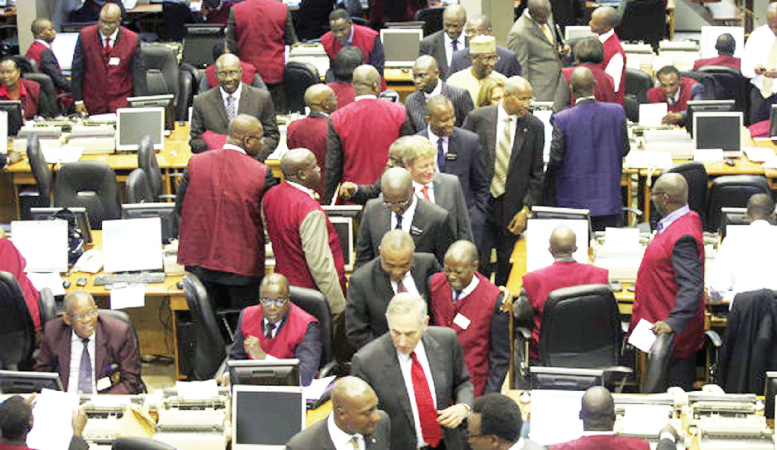- Capital Market Investors Reject New FRCN Corporate Governance Code
- Says directive is anti-investment, high-handed
Investors in the nation’s capital market have rejected the new, National Code of Corporate Governance, prescribed by the Financial Reporting Council of Nigeria, FRCN, saying it is inimical to further investments, while also being high-handed.
After due considerations of the new regulation, which became effective on October 17th, the investors insisted that the FRCN did not incorporate the inputs made to it in a position paper and the three public hearings before the Code was enacted.
Speaking more on the contentious Code at a press conference yesterday, in Lagos, the National Coordinator, Independent Shareholders Association of Nigeria IISAN), Sunny Nwosu, insisted that its introduction should have been more democratic.
He said: “Yes, we were invited to make our input and we presented a position paper, which we submitted to the Council as well as participated in the three public hearings on the Code. But what we have now is a unilateral decision, and we will not support any legislation that conflicts with the Companies and Allied Matter Act, CAMA.
“As much as we will not support company managers to be reckless, we will also not support overbearing regulators. We will support any corporate governance that will encourage investors, not one that will pull them down. And we say that this FRCN Code, which is made compulsory, will not encourage returns on investment.”
The Financial Reporting Council recently released a set of codes, which it claimed was: “In accordance with Section 50 of the FRCN Act, 2011, which among other things, requires the Directorate of Corporate Governance to develop the principles and practices of Corporate Governance applicable in Nigeria.”
Accordingly, the Council came up with three separate regulations, tagged: the National Code of Corporate Governance, effective 17th October 2016, which stipulated: The Code of Corporate Governance for the Private Sector is mandatory; The Code of Governance for Not-for-Profit entities is “Comply or Justify non-compliance” and the Code of Governance for the Public Sector will not be applicable immediately until an executive directive is secured from the Federal Government of Nigeria. This is due to the fact that the enabling laws that set up most government establishments already carry some form of governance structure that will require an umbrella legislation to unify the different provisions of those laws to synchronise with this Code.
But reacting to specific provisions for the respective Code, ISAN insisted it would have a “suffocating effect on entrepreneurial aspirations and initiatives of Nigerians and persons seeking to establish business in the country.”
Apart from the perceived negative implications of over regulation of Nigeria’s corporate world, the shareholders also maintained that the code contained “noticeable contradictions and conflict with the subsisting CAMA, as amended.”
Elaborating on the stifling effects of the Code, Nwosu blamed it for the inability of the Board of Directors of StanbicIBTC Plc to publish its financial performances since 2015. He pointed out that even the auditors of the bank, KPMG, had even withdrawn its suit against the FRCN due to the stringent penalties against any company challenging its authority in court.
Furthermore, any sanctions or fine imposed on a company, as in the case of STanbicIBTC, which was fine N1billion last year for accounting irregularities, impacts directly on investors’ return, as such will be netted off as part of the operation cost rather than profit.
According to Nwosu, some of the grey areas identified in the Code include the provisions that “companies shall have not less than five directors,” which he said is “unnecessarily expansionary and costly,” particularly for the Micro, Small and Medium Enterprises (MSMEs).
Besides, he noted, the FRCN is flouting its own rule, as it was yet to constitute its own board, saying, that the Council “…must provide leadership in the nation’s corporate world by constituting its board in line with its new corporate governance code.”
Furthermore, he noted that the code “allows executive directors of the companies to be appointed board members of another company or companies.” He also picking holes with the “cool off period” for former chief executives, saying the seven to 10 years ban are too long and should be reduced to at least three years.

 Forex3 weeks ago
Forex3 weeks ago


 Naira2 weeks ago
Naira2 weeks ago
 Billionaire Watch2 weeks ago
Billionaire Watch2 weeks ago




 Naira3 weeks ago
Naira3 weeks ago




 Naira2 weeks ago
Naira2 weeks ago




 Naira1 week ago
Naira1 week ago




 Naira4 weeks ago
Naira4 weeks ago




 Naira4 weeks ago
Naira4 weeks ago






















